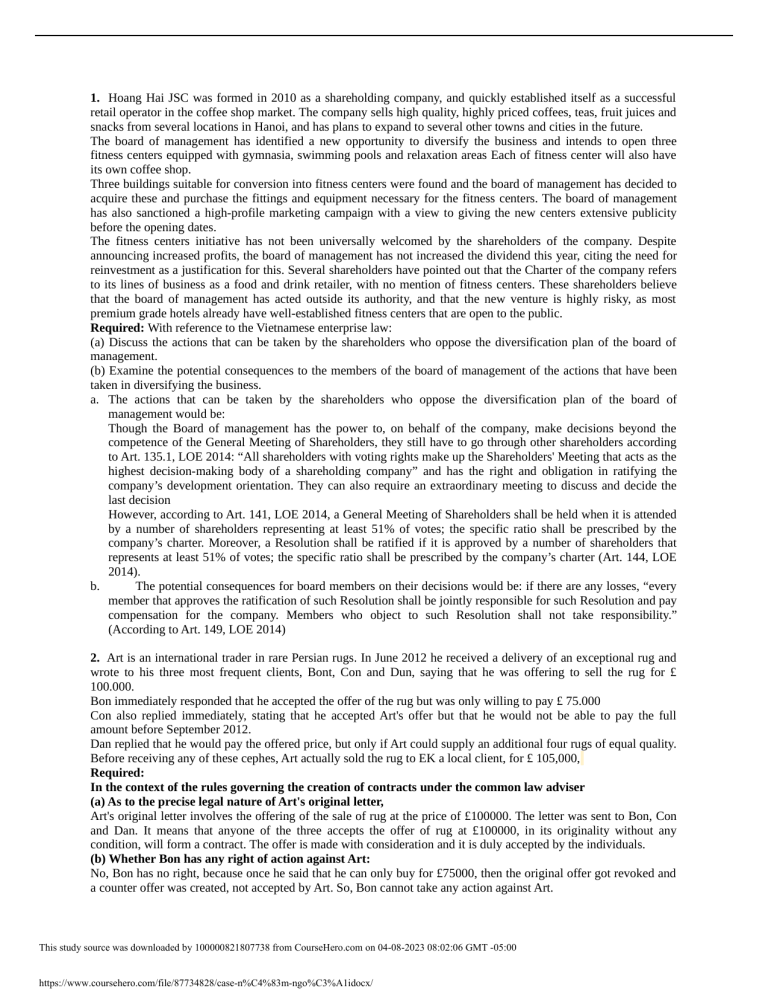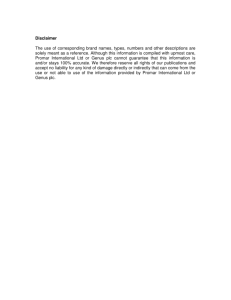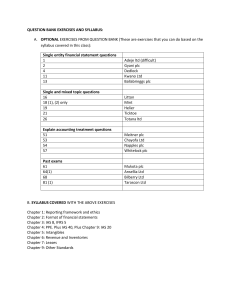
1. Hoang Hai JSC was formed in 2010 as a shareholding company, and quickly established itself as a successful retail operator in the coffee shop market. The company sells high quality, highly priced coffees, teas, fruit juices and snacks from several locations in Hanoi, and has plans to expand to several other towns and cities in the future. The board of management has identified a new opportunity to diversify the business and intends to open three fitness centers equipped with gymnasia, swimming pools and relaxation areas Each of fitness center will also have its own coffee shop. Three buildings suitable for conversion into fitness centers were found and the board of management has decided to acquire these and purchase the fittings and equipment necessary for the fitness centers. The board of management has also sanctioned a high-profile marketing campaign with a view to giving the new centers extensive publicity before the opening dates. The fitness centers initiative has not been universally welcomed by the shareholders of the company. Despite announcing increased profits, the board of management has not increased the dividend this year, citing the need for reinvestment as a justification for this. Several shareholders have pointed out that the Charter of the company refers to its lines of business as a food and drink retailer, with no mention of fitness centers. These shareholders believe that the board of management has acted outside its authority, and that the new venture is highly risky, as most premium grade hotels already have well-established fitness centers that are open to the public. Required: With reference to the Vietnamese enterprise law: (a) Discuss the actions that can be taken by the shareholders who oppose the diversification plan of the board of management. (b) Examine the potential consequences to the members of the board of management of the actions that have been taken in diversifying the business. a. The actions that can be taken by the shareholders who oppose the diversification plan of the board of management would be: Though the Board of management has the power to, on behalf of the company, make decisions beyond the competence of the General Meeting of Shareholders, they still have to go through other shareholders according to Art. 135.1, LOE 2014: “All shareholders with voting rights make up the Shareholders' Meeting that acts as the highest decision-making body of a shareholding company” and has the right and obligation in ratifying the company’s development orientation. They can also require an extraordinary meeting to discuss and decide the last decision However, according to Art. 141, LOE 2014, a General Meeting of Shareholders shall be held when it is attended by a number of shareholders representing at least 51% of votes; the specific ratio shall be prescribed by the company’s charter. Moreover, a Resolution shall be ratified if it is approved by a number of shareholders that represents at least 51% of votes; the specific ratio shall be prescribed by the company’s charter (Art. 144, LOE 2014). b. The potential consequences for board members on their decisions would be: if there are any losses, “every member that approves the ratification of such Resolution shall be jointly responsible for such Resolution and pay compensation for the company. Members who object to such Resolution shall not take responsibility.” (According to Art. 149, LOE 2014) 2. Art is an international trader in rare Persian rugs. In June 2012 he received a delivery of an exceptional rug and wrote to his three most frequent clients, Bont, Con and Dun, saying that he was offering to sell the rug for £ 100.000. Bon immediately responded that he accepted the offer of the rug but was only willing to pay £ 75.000 Con also replied immediately, stating that he accepted Art's offer but that he would not be able to pay the full amount before September 2012. Dan replied that he would pay the offered price, but only if Art could supply an additional four rugs of equal quality. Before receiving any of these cephes, Art actually sold the rug to EK a local client, for £ 105,000, Required: In the context of the rules governing the creation of contracts under the common law adviser (a) As to the precise legal nature of Art's original letter, Art's original letter involves the offering of the sale of rug at the price of £100000. The letter was sent to Bon, Con and Dan. It means that anyone of the three accepts the offer of rug at £100000, in its originality without any condition, will form a contract. The offer is made with consideration and it is duly accepted by the individuals. (b) Whether Bon has any right of action against Art: No, Bon has no right, because once he said that he can only buy for £75000, then the original offer got revoked and a counter offer was created, not accepted by Art. So, Bon cannot take any action against Art. This study source was downloaded by 100000821807738 from CourseHero.com on 04-08-2023 08:02:06 GMT -05:00 https://www.coursehero.com/file/87734828/case-n%C4%83m-ngo%C3%A1idocx/ (c) Whether Con has any right of action against Art: Con has no right of the action, because Con also added the condition of a late payment that was not mentioned in the original offer. Further, late payment conditions as a part of the counter offer was not accepted by Art. (d) Whether Dan has any right of action against Art. Dan has no right of action against Art, as the original offer was of only one piece of rug. But, Dan made the counter offer to buy it along with other similar 4 pieces. It was not accepted by Art as the letter could also not reach him. (e) Would the answers in question (a), (b), (c) and (d) be different if the Vietnamese law apply? Explain your answer carefully and refer to any relevant cases in your materials. According to Article 392, 393 of Vietnam Civil Code 2015 about contract, there is no difference because Bon, Con and Dan make a counter offer with additional conditions that the offer would become a unilateral contract. Therefore, Art has no responsibility to follow that counter offer. 3. Thai Hoang Joint Stock Company is seeking to raise additional equity finance. The board of management of the company is negotiating with Hai, a wealthy investor, in the hope that he will purchase new shares in the company. Hai has expressed an interest in this investment but has insisted on several conditions. He wants to be guaranteed a position on the board of management for a minimum of three years. He also wants the board of management to sign an undertaking that he will be paid a minimum annual return on his shares of 6%. Hai has specified that all his shares must be paid before any other shareholders if the company is bankrupt. Required: Discuss the extent to which the board of management of Thai Hoang JSC will be able to meet Hai's demands with the respect to the rules under Vietnamese law. Answer: It is acceptable for Mr. Hai to be guaranteed a position on the board of directors for at least 3 years if he has experience, qualifications in business administration, unless otherwise prescribed by the company’s charter. Also, he must be legally competent and is not banned from enterprise management based on Art. 65 LOE 2014. In this case, we don't know whether Mr. Hai buys common shares or preferred shares so it is possible for Mr. Hai to be paid a minimum annual return on his shares of 6% if he buys preferred shares, otherwise this clause will not be accepted according to Art. 117 LOE 2014. In addition, preferred shares have the priority over common shares in the payment if the company is bankrupt. Therefore, if Mr. Hai doesn't buy preferred shares, he won’t have the right to be paid before any other shareholders (Art.117 LOE 2014). 4. Zapata Co. Ltd. is a company that installs flooring in restaurants and office buildings. It sends its customere catalogue in the mail advertising flooring for€3.25 per square meter 。But this is a mistake and the catalog should have advertised the flooring for f32.50 per sauare meter 。 One of the customers sends an email ordering one hundred square meters to be installed at f3.25 per square meter 。Zapata Co. Ltd. sends an email explaining that the catalogue is a mistake , but the customer insists that the company must provide the flooring at€3.25 per square meter。Required:With reference to the common law, (a)Do you think there is a valid contract to install the flooring at€3.25 ?Advise Zapata Co. Ltd. whe must install the flooring at this price。 (b)Would the answers in question(a)be different if the Vietnamese contract law apply? Explain your answer carefully and refer to any relevant cases and statutes in your materials Answer: a. Generally, advertisements, catalogs, brochures, and announcements to the public related to the sale of merchandise at a specified price are not considered offers to enter into a binding contract. Rather, they are considered invitations to make a deal. As such, it will usually not be a breach of contract when the advertiser refuses to sell an item at a price he/she advertised. In this case, Zapata Co. Ltd sends its customer catalogue in the mail advertising flooring for€3.25 per square meter, it means this company communicates to the public, not to a specific person or persons, so the catalogue that Zapata Co.Ltd sent is not considered an offer. Therefore, there is not a valid contract to install the flooring at €3.25 b. Article 386. Offers to enter into civil contracts 1. Offer to enter into a contract means a clear expression by the offeror of its intention to enter into a contract and to be bound by such offer made to another specific party or the public (hereinafter referred to as the offeree). This study source was downloaded by 100000821807738 from CourseHero.com on 04-08-2023 08:02:06 GMT -05:00 https://www.coursehero.com/file/87734828/case-n%C4%83m-ngo%C3%A1idocx/ According to Art 386.Civil Code of Vietnam 2015, the catalogue is not considered an offer, therefore, the answers in question a is not different if the Vietnamese contract law apply. 5. Thomas is a brand-new car dealer. He has several new Toyota Camry 2.4 cars. He advertised in the Saturday edition of his local newspaper stating: "New Toyota Camry 2.4: £20,000 cash." When Ben sees the adverts he immediately posts a letter of acceptance of Thomas's offer. Carol also sees the advert and after inspecting the car, offers Thomas a cheque for £20.000, he refuses to accept the cheque and tells her she cannot have the car. Later in the day Dave asks Thomas if he will keep the offer open until he can get to his bank to arrange a loan. Thomas agrees but later in the day when Eric says that he will pay £20.00C to arrange cash for the car he agrees to sell the car to Eric. On Monday morning Ben's letter arrives, and Dave returns to complete his purchase of the car. In the afternoon Eric phones Thomas to say that he has had second thoughts and no longer wishes to buy a car. Required: Consider the above situation with the respect to the rules governing the element. contracts under the UK common law: 1. Whether Ben has entered into a binding contract with Thomas. 2. Whether Carol has entered into a binding contract with Thomas. 3. Whether Dave has entered into a binding contract with Thomas. 4. Whether Thomas has any right of action against Eric. Explain your answer carefully and refer to any relevant cases in your materials. Answer: A contract is formed when a person makes an offer, which gets accepted by another person agreeing all the conditions of the contract by communicating assent of performing the offers' terms. 1) Acceptance by letter takes place when it is put into postbox. As Ben, just after seeing the ad, posted the letter of acceptance, agreeing all the terms, the contract gets binding. Thomas can not impose on Ben to reject the offer without his consent. 2) No, Carol did not agree to all terms. She counter offered the cheque although cash was required as term of contract or means of payment. Here no contract is formed. 3) Dave also gave his consent of acceptance of contract. BUt his acceptance is based on arrangement of loan. No contract formed. Thomas is not bound to sell Dave, if he comes. 4) Yes, Eric entered into the contract because he communicated the consent and this consent was counter accepted. 6. Elements plc is the parent company in a group of companies operating in the production and distribution of watersports equipment in the United Kingdom. Elements plc holds the majority of shares in Aqua Ltd, which supplies the watersport equipment to local sellers. The remaining shares are held by two directors of Aqua Ltd, both of whom were appointed by Elements plc. Swimmers Ltd is one Aqua Ltd's major suppliers and creditors. It has been striving to obtain payment for deliveries supplied to Aqua Ltd. However, it has recently learnt that Aqua Ltd has ceased trading. Moreover, it seems that in the last five months, materials delivered to Aqua Ltd, and orders received by Aqua Ltd, were all passed on to Waterfalls Ltd. Waterfalls Ltd is a wholly-owned subsidiary of Elements plc, and was only recently incorporated. Required: With reference to the UK common law: Advise Swimmers Ltd whether it can obtain payment from either Elements plc or Waterfalls Ltd in respect of the debts of Aqua Ltd. Answer The Swimmers Ltd. can obtain the payment from Element plc as the majority of shares of Aqua Ltd. are held by Elements plc. Another reason of the same is that Waterfalls Ltd is the subsidiary company of Elements plc. So, Element plc is liable for the payment of Swimmers Ltd. as both other companies are under Element plc. Since Elements plc holds the majority shares in Aqua Ltd, Swimmers Ltd can claim and obtain its payment from Elements plc. It should also be noted that Waterfalls Ltd is owned wholly as a subsidiary company of Elements plc, this makes them (Elements plc) liable for the debts incurred by Aqua Ltd and Waterfalls Ltd if it was contractually agreed. The referenced material is found in the link attached. This study source was downloaded by 100000821807738 from CourseHero.com on 04-08-2023 08:02:06 GMT -05:00 https://www.coursehero.com/file/87734828/case-n%C4%83m-ngo%C3%A1idocx/ Powered by TCPDF (www.tcpdf.org)






